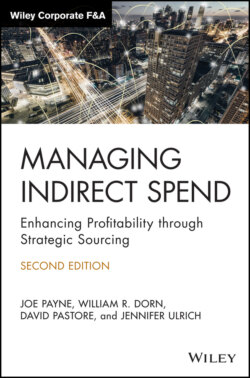Читать книгу Managing Indirect Spend - Joseph Payne, Joe Payne - Страница 40
Response 3: Pushback
ОглавлениеSometimes, a supplier flat‐out refuses to provide a line‐item detail report. This is typically the exception and not the rule, but when this issue does arise, it is important to understand why.
First, the sales representative might not know how to get the reports you need. An inexperienced individual may decide to tell you the reports are not available. Alternatively, they may try to find out how to get them, fail, and then give up. Other representatives may tell you that a report is unavailable in hopes that you will give up the pursuit. For this reason, it is helpful to hold onto any reports you receive when you finally do get them for the supplier's reference the next time you need to make such a request.
Second, the report may truly be unavailable. While this is highly unlikely in most industries, small businesses often do not have access to the same reporting capabilities or sales tracking systems as larger organizations. The push‐back may be due to the great deal of time and effort necessary for creating a custom report or to have someone enter data into a spreadsheet for you.
Third, the relationship between your company and the supplier may not be very good. A supplier who has not been paid on time, has experienced numerous account management issues, or simply does not value your account may decide that a request for reports is the last straw and may even decide to terminate the relationship.
The last reason a supplier may not provide line‐item detail is the most obvious and the most common. The supplier knows they are not competitive, and they want to prevent you from discovering that fact. Similarly, the supplier may realize that negotiations and sourcing are imminent, and the longer they can withhold the data you are looking for, the longer they can bill at current rates before discounting in order to retain the business. In an industry with a limited supply base (one or two predominant suppliers) or situations where the supplier feels the business is secure and can't easily be moved to another supplier, this is the most common type of response.
The pushback response is the most difficult to overcome, but as you can see, the supplier might take this position for many different reasons. It is important to understand your supplier's rationale before formulating your response. If a supplier truly does not have access to the requisite reporting, you may need to look for other ways to collect the data. If a supplier has decided the request is too much of a burden on an already strained relationship, you can look for ways to improve the relationship first and get the data you need later. If you find the supplier is taking an aggressive posture to protect their high margin, you may need to take one yourself to get the supplier to honor your request. You can employ several tactics, including going around your primary sales representative, working with your own internal end users to find a better contact within the supplier organization to get the data you need, requesting a new primary sales representative, letting the supplier know that competitors would be willing to provide the data, or suggesting that an agreement might not be renewed if the request is not met. These aggressive tactics should be used only as a last resort and with a supplier that you are confident has access to the data you need.
You should note that many contracts already include language stating that a supplier agrees to provide reports or to be audited, yet many times these contractual obligations are overlooked when requests for reports are made. If you are experiencing pushback, the first thing to do is determine whether or not these contractual obligations exist.
